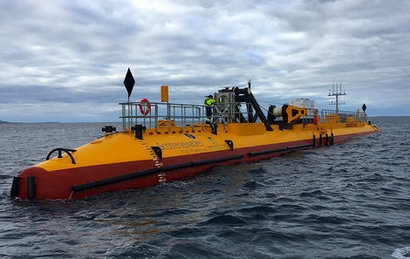
Led by the European Marine Energy Centre (EMEC) in Orkney, the 11 million euro Integrating Tidal Energy into the European Grid (ITEG) project brings together partners from across the UK, France, Belgium and the Netherlands to address energy-related carbon emissions in North-West Europe and tackle grid export limitations faced in remote areas such as Orkney.
The project consortium includes EMEC, Scotrenewables Tidal Power, AREVA H2Gen, the Energy Systems Catapult, Energy Valley/New Energy Coalition, University of Caen Normandy, University of Le Havre Normandy, Ghent University and the Normandy Development Agency.
Funded by the Interreg NWE programme, part of the ERDF (European Regional Development Fund), the project will deliver an onshore energy management system at EMEC’s Fall of Warness tidal test site, off the northern Orkney island of Eday. This will support the production of hydrogen using an AREVA H2Gen electrolyser, the first to be deployed in the UK, which will be powered by Scotrenewables’ next generation 2 MW floating tidal energy converter, the SR2-2000.
The project will benefit from the marine energy expertise of the University of Caen Normandy who will support the development of the advanced energy management system and the University of Le Havre Normandy who will focus particularly on the impacts of converter choices on the quality of energy exchanges taking into account the specificities of hydrogen technologies.
“With ever-large amounts of variable renewable energy generation being added to the European grid, issues around energy system management are requiring an even more integrated approach” said EMEC’s Commercial Director, Oliver Wragg. “By combining world-leading technology developed in North West Europe with EMEC’s leading research infrastructure, we will demonstrate how predictable renewable tidal energy combined with hydrogen, can enable decarbonisation across the electricity, heat and transport sectors. By supporting the ITEG project Interreg NWE has shown great vision and leadership to ensure North West Europe plays a world-leading role in the transition to a 100% clean energy system.”
The cost of pre-commercial demonstration for ocean energy is high and investors are reluctant to invest until the technology has been proven in the sea at scale. ITEG sets out to drive down these costs through the development of an integrated hydrogen production solution. Throughout the project, ITEG will aim to maintain 20 direct jobs and 40 indirect jobs, adopt 3 applied low carbon technologies, reduce GHG by an estimated 3000, produce an additional capacity of 2 MW of renewable energy and develop the cooperation of research institutions with 15 enterprises.
Image: Scot Renewables SR2000
For additional information:

